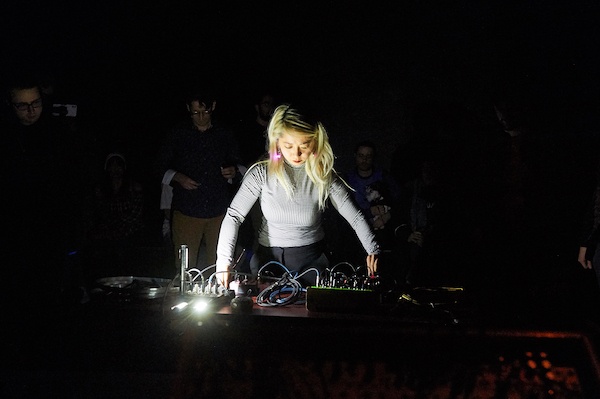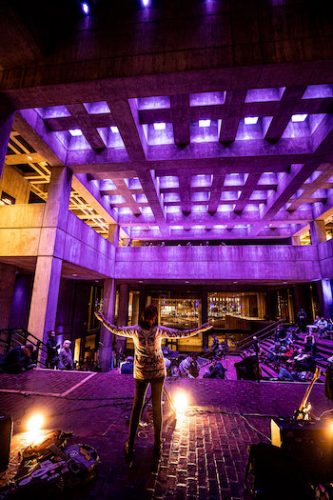Performing Arts Series: Stories of Surviving COVID-19 — Non-Event
Editor’s Note:
What lies beyond COVID-19 for the arts community? In a recent e-mail, Boston Baroque wrote that it “understands that collective community experiences in places like concert halls will be forever changed by this pandemic.” I am asking small to medium performing arts organizations to talk about the forms this transformation will take, their plans for survival and the future. Double Edge Theatre has contributed its thoughts, as has the Boston Baroque, Handel & Haydn Society, and New England Conservatory.
Founded in 2001, Non-Event has presented over 350 concerts in and around Boston in a wide variety of venues from coffee shops, galleries, and loft spaces to former movie palaces, university lecture halls, museums, night clubs, 19th-century ballrooms, a Victorian-era pumping station, and inside Boston’s iconic City Hall. I asked Susanna Bolle, the artistic and executive director of Non-Event, about what the organization’s plans were for the future, given how uncertain the terrain for live presentations had become, no matter how unconventional the venue.
— Bill Marx
The last Non-Event concert out in the world was on March 10. It was a small show, the third of a new monthly series of informal performances featuring mostly local experimental musicians in the Village Vinyl & HI-FI record shop in Coolidge Corner.
The night featured two key players in the local experimental scene, vocalists Noell Dorsey and Andrea Pensado, performing together for the first time. In spite of the anxiety about COVID, the audience was enthusiastic. At the end, as the crowd dispersed, there were elbow bumps, instead of hugs, and a general sense of foreboding. Someone joked that we all had just witnessed the last experimental music show in Boston. But, really, when we loaded the PA into the car and parted company that night, even the most pessimistic among us could not have anticipated how profoundly things were about to change.
What we did know was that we would not cease activities altogether. At first, we held out a vague hope that the outbreak would be mild and we’d be able to salvage some of our spring season, which was to have included a site-responsive performance by Keith Fullerton Whitman among the giant steam pumps at the Waterworks Museum, a showcase of noise and improvised music in the former home of Out of Town News, and a quadrophonic performance by the Berlin-based sound artist Jessica Ekomane at the newly reopened Goethe-Institut. It wasn’t all that long, in spite of much scrambling and vain attempts to reconfigure and reschedule (rinse and repeat), before one by one everything had been canceled and the realization hit home that we would be dealing with the pandemic and its aftereffects for the foreseeable future.

Victoria Shen at the Dissolve Festival in 2020. Photo: Peter Gumaskas.
Luckily, it turns out that we are fairly well-suited to facing at least the initial disruption of the COVID era. Because we are small and nomadic, we have no physical space to maintain, or rent, or much in the way of staff to pay. We are also accustomed to working in challenging and unconventional spaces, technical setups, and situations. Even though we have a long history, we’re still very much a DIY-style organization, so we can be quite adaptable.
Even as we were packing up after the show at Village Vinyl, our technical director Kevin Micka and I were sketching out ideas for what experimental music at a distance might look like. Like so many organizations, we decided to move into presenting music online. We weren’t particularly interested in trying to replicate the live concert experience online. Instead, we adopted what we hoped would be a more flexible approach that would allow artists to take advantage of the online space as a different platform in which to perform, experiment, and create new work.
We began to set some basic guidelines for the biweekly series that we called Non-Event at Home. The programs would take a variety of forms. Often they have been live stream sets by solo artists performing in their homes, but more often than not, they have consisted of new sound works, audio/visual pieces, or prerecorded live sets made during social distancing.

Kate Village at Boston City Hall in 2019. Photo: Tim Bugbee.
We also made the deliberate decision to focus on presenting artists based in New England (with the occasional exception allowed for artists we’d booked for shows in March and April or those with strong ties to the region). A key impetus for organizing performances during social distancing, beyond the work itself, was to maintain the sense of community for both artists and audience, as well as providing some form of financial support.
Our first online program was on March 27 and featured performances by two of the musicians who had been slated to play a show that had been planned for the Out of Town News kiosk in Harvard Square at the end of March. Since then, we have been extremely busy. As I write this just after the July 4th holiday weekend, we’ve posted 29 online programs featuring over 50 artists. To give a frame of reference, in 2019 we presented 21 concerts over the course of an entire year.
We’ve been really knocked out by the extraordinary variety and inventiveness of the work we’ve been fortunate enough to present so far, which very much speaks to the vitality of the experimental music scene in New England. What’s been most exciting for us about this project, with its ambitious pace, has been the fact that it has led us to learn about and connect with new artists and fascinating pockets of musical activity in the region – and we’ve only begun to scratch the surface. You can get some sense of it by looking through the archive of programs on our website.
As we contemplate what comes next, one of the few things that seems clear is that the bulk of our programming will have to be online through the end of the year and possibly well into 2021. A number of our colleagues and friends have begun to make tentative forays back into the world, organizing informal outside performances in parks and on rooftops with masks and social distancing required.
For now, however, we have no outside concerts in the works. We’ve begun discussions with our various presenting partners and venues to begin exploring the possibilities of presenting a hybrid series that mixes a concert with a small in-person and socially distanced audience while still maintaining a strong online component so that we can reach a broader audience.
Our goal is to use the disruption that has been forced upon us by the pandemic as an opportunity to reevaluate what we do and our role in the larger culture. There are other, arguably more powerful, and certainly more positive, forces upending the status quo right now, which are the uprisings that have emerged in protest of the murders of George Floyd and Breonna Taylor at the hands of the police. To return to the status quo is not only impossible, it would be an unconscionable failure. For Non-Event, which is a predominantly white organization, we need to listen better and work to adopt a more expansive and equitable view of what experimental music is and can be. It will require sustained effort over the long haul. These are tumultuous, but, ultimately, hopeful times.
Susanna Bolle is a Boston-based concert organizer, music writer, and radio host. Since 2001, she has organized over 300 performances and installations by local, national, and international experimental musicians, mostly as a curator and then director of Non-Event. She has presented at Dissolve at MIT, EMPAC, Le Leboratoire Cambridge, and NEC’s SICPP. She is also the longtime host and producer of the weekly radio program, Rare Frequency, on WZBC.
